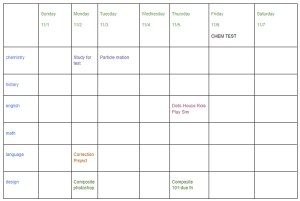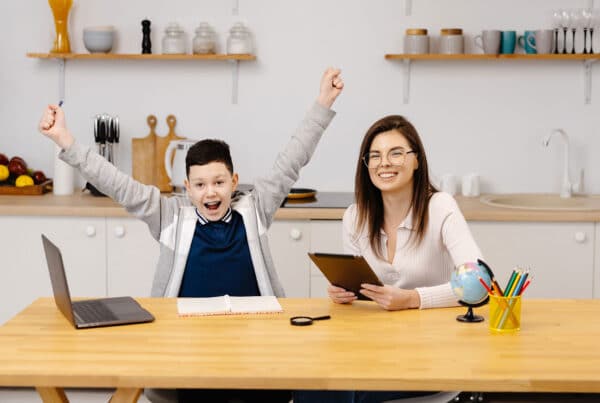Last Updated On: July 1st, 2024
In a world full of electronic devices, online schooling, and digital homework portals it’s no wonder that students are finding it hard to stay organized. This is where executive function skills become the crucial piece in helping your child find success.
Executive functioning is “the mental processes that enable us to plan, focus attention, remember instructions, and juggle multiple tasks successfully.” It can help improve your problem-solving, cognitive flexibility, and even your working memory because you’ll be keeping track of everything that you need to. For more on the importance of executive function and self-regulation skills read the full article from Harvard at Executive Function & Self-Regulation.
If you’re still pondering the meaning of this big word…let me be of service!
If you update your daily homework in a paper or digital planner/app, YOU ARE using executive functioning skills.
If you write down a to do list for the month or week, YOU ARE using executive functioning skills.
If you add big projects to your calendar on your phone, computer, or planner, YOU ARE using executive functioning skills.
But what does it mean?
Here’s the thing…executive functioning is a big umbrella word that can apply to many things. Adults do it all the time and have no idea this is even a term. We usually call it “staying on top of things.” It requires a whole lot of emotional control and decision-making to do properly, but it can help you be successful.
However, I see many adults–parents, employers, friends–that can’t manage their personal and professional todos if they smacked them in the face; essentially, executive dysfunction. This big, scary executive functioning is essential and definitely a work in progress.
While I would love to imagine a world in which nothing falls through the cracks, even me, The Jedi Master of EF, can miss something. Thank goodness for my organizational systems though. When one thing is missed, I learn from this and make changes. After all, sometimes our short-term memory fails us. I am constantly thinking up ways to make my system better—trying the latest organizational methods, experimenting with new technology, playing with color coding on paper and digital platforms. Although it can seem like a bore to most, you really have to find your way in. Every person has a different learning style and cognitive skills, and various strengths or weaknesses in the digital era and that dictates what simply “works best.”
What about my child?
Now, let’s talk about children with Executive Functioning trouble. This is very common. Most of us were raised in an environment where teachers wrote down things. We simply copied down homework from the board into a paper planner and called it a day.
These days everything is quite different, and much more self-monitoring. Kids typically have to manage their own emails by middle school, then have to deal with a school platform that may have classwork, homework, a syllabus, etc along with Google Classroom where they are assigned homework, classwork, and projects. Yikes!
Since technology continues to creep into our lives it’s important that children develop these important skills in early childhood so they aren’t faced with the impossible later down the road, in high school and later. With proper executive functioning skills, you can essentially train your brain function to work the way you need it to. KQED backs this using data, “One meta-analysis of six studies found that a child’s executive functioning skills in kindergarten predicted reading and math achievement into middle school and beyond.” For the full article: Why Executive Function Is A Vital Stepping-Stone For Kids’ Ability to Learn.
For children with learning disabilities like attention-deficit/hyperactivity disorder (ADHD) and dyslexia, or those who suffer from executive function disorder, this can be even more helpful. It takes time to learn what works best when it comes to child development and executive functioning issues, but in the long run, it’s worth the effort. Making lists and keeping things organized can help with impulse control and attentional and emotional regulation in the long run, which will only help your child.
I’m not even organized! How do I help my child?
Here’s a list of a few places to begin the journey:
THE AGENDA: The place where you write down daily tasks
Options:
- Paper planner: Tried and true
- White board: Great if you love bright color and prefer more freedom in the way you want to list things out
- Google Doc: Good for the digital kids that hate paper, it’s SUPER easy to make a chart and list off each subject. Then kids can share the doc with their parents and highlight when they’re done with a task. For a quick example you might use something like the below screenshot.
- Task oriented apps- There are a million task list apps out there and the number grows by the day. Some of my favorites include: MyHomework, Sticky Notes, and To-Do.
THE CALENDAR: The place where you write down monthly tasks–projects, upcoming essays, tests, anything that’s due further than four days out
Options:
- Paper calendar: It’s easy breezy, but does require the wall space. Cheap too! $1 at the Dollar Store.
- Calendar apps: Whether you have Apple or Android you probably have a preference between iCal and Google Calendar. Personally I have an iPhone, but I think Google Calendar has superior technology. So what do I do? USE BOTH! I have both synced up to my iCal and anytime someone sends me a Google Calendar event/invite/project/meeting it auto adds to my iCal. I like this system so I can easily access everything I need from both my phone and computer.
- ESSENTIAL HACK- Make a separate calendar for homework, tests, projects/major assignments, and social/FUN! I make each one a different color and encourage my students to do the same. This way when you look at your calendar on any device it’s FULL of color and both appealing to the eye and allows you to look forward to FUN FRIEND DAY aka YELLOW! Great for visual learners and helpful when you’re trying to prioritize!
- White Board Calendar- Just like the weekly or daily calendar they make white boards with a full sized calendar. While I much prefer the weekly version, I have seen a lot of success with the large monthly calendars too. Just make sure you don’t use this as your primary go to. What would be even better…have a monthly and a weekly white board!

THE ROUTINE: Your daily practices after school ends
Step 1: Check Google Classroom
- Did you finish all the classwork? No, write it down in your agenda.
- What do you have for homework? Write it down.
- Any late or missing work? Write it down.
- Did you teachers ask you to redo anything? Write it down.
Step 2: Check School Portals
- Any homework that’s only listed here?
- Are my grades up? Do I have anything missing?
Step 3: Questions
Am I confused on any assignments? Which ones? Can my parents help me? If not, I should email the teacher and ask right away.
Step 4: Make a GAME PLAN
ALWAYS WRITE THIS OUT ON A GOOGLE DOC, PAPER, OR WHITE BOARD
- What homework do I want to do first? What requires the most mental energy? I should do that first. Things that are mindless or require less focus for me come last. MAKE A LIST. LISTS are friends. Prioritizing tasks can really help in self-management. You can even make up a rating scale if you struggle with this.
- How long will each assignment take me? 30 mins? 45 mins? Always round up! Write this number next to each assignment.
- Map out my night minute by minute (adding in breaks for sanity and dinner for fuel)
- Not great at time management? Try the Pomodoro method! The Pomodoro Technique® – proudly developed by Francesco Cirillo | Cirillo Consulting GmbH does a great job of outlining the basics on their website. Also, I LOVE the BeFocused app that implements the Pomodoro Method. My students love this method and have found so much success with these time limits. Implementing time limits really helps focus on self-control because you know when your next break is.
Step 5: Check it off
But why? Because checking tasks off makes us feel good. It inspires us to keep going, according to neuroscience studies. Positive reinforcement is the key to our ability to wake up and repeat, sometimes even with increased processing speed. We need to take care of ourselves. Highlight your wins, check the boxes, star and cross through every big task you finish. It’s important to see the victories!
Although this is merely a place to start, it’s also the stepping stone to a more harmonious and effective lifestyle for your student.
To find out more ways to prepare for challenges of organization during online schooling read more at our blog 6 Tips to Help You Start Online Schooling With a Bang




















